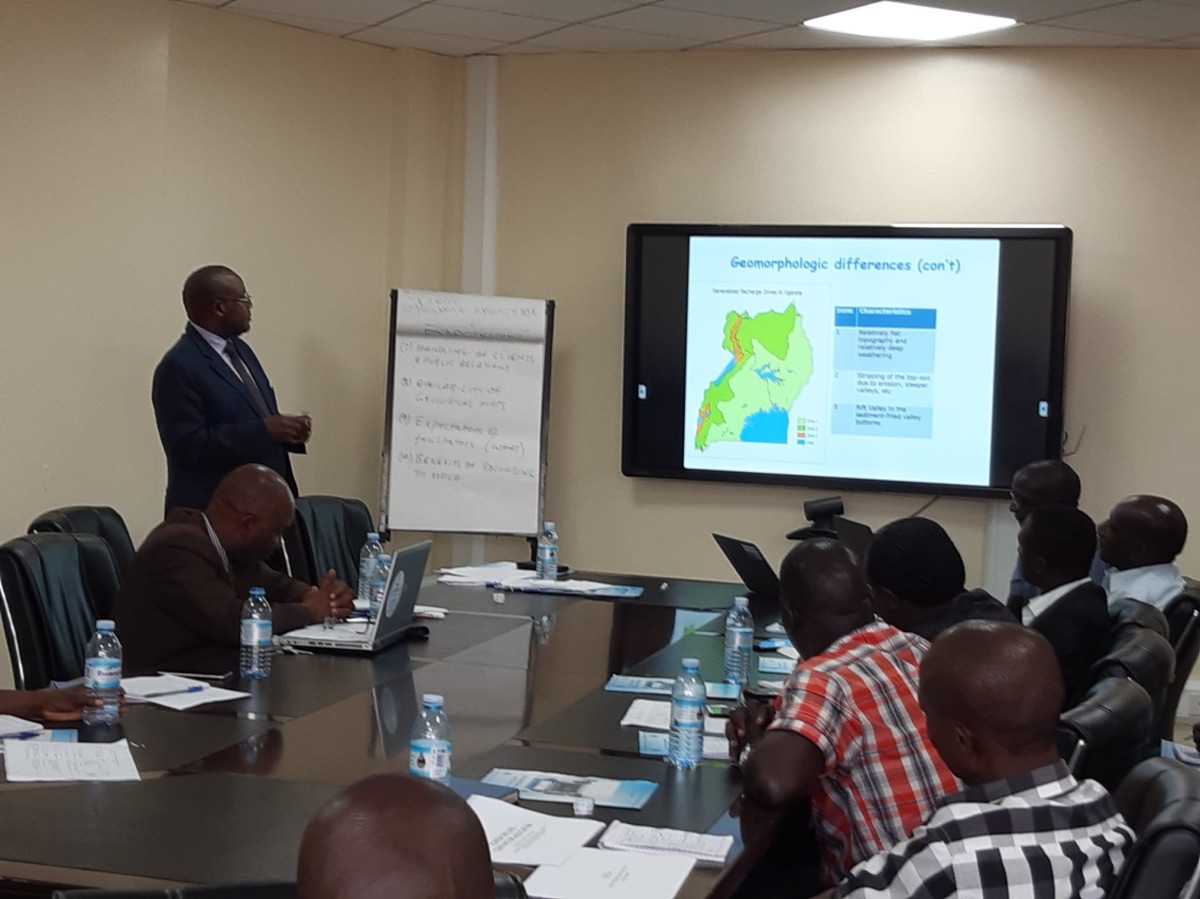Being back in Uganda again after an absence of five years gives me immense joy. This country of warmth, friendliness and humour, where one can literally have an engaging conversation with anyone, whether askari (guard), taxi driver, fruit and vegetable seller, driller or civil servant. Thus, my few days here have been filled with shared laughter and kaboozi (Luganda for conversation or gossip, but the word conveys so much more).
My visit to Kampala has coincided with the first day of a three-day training entitled “Practical Skills in Drilling” by Uganda’s Water Resources Institute. The training is for 25 drillers and assistant drillers, and comprises a classroom day, followed by two days in the field. As we sit waiting for the training to commence, I ask the participants (all men so far) why there are no women drillers. We talk about the man’s world of drilling (stamina needed), and the women’s world of fetching water (stamina needed). The discussion is engaging and together we reflect on the role of women and men in society and the home. For my side I feel proud to be one of the few women involved in drilling and talk about the two manual companies that I have heard about in Zambia which are run by women. On the spot, I really wish that there were many more of us….
The training commences. The course is a collaboration between the Ministry of Water and Environment (MWE) Water Resources Institute (WRI) and the Uganda Drilling Contractors Association (UDCA). The Chair of the Association, Dr Flavio Pasqualato from Draco (U) Ltd., gives a his opening words of encouragement, followed by the Managing Director, Anthony Luutu of Aquatech Ltd. I am invited to say a few words, and express my delight at seeing training of drillers that I wish was happening on a regular basis in ALL countries on the African continent and beyond.

Gracious Sembali systematically collects the expectations of the participants
Dr Callist Tindimugaya (MWE) officially opens the training, pointing out that when people are learning informally from each other, that the message will change over time. I think of the game of Chinese whispers and vow to include it as an icebreaker at the start of my next drilling training course make his point. Callist also adds that “Nobody has all the knowledge; you can learn from each other”, something that is key in adult education.

Dr Callist Tindimugaya explains the hydrogeology of Uganda to participants
Trying to raise drilling professionalism is a significant undertaking, and I am struck by the pragmatic messages that Callist conveys to all of us. “If you and your colleagues are doing a good job, you will raise the respect for drillers in Uganda…..we want drillers to be seen as serious and doing good quality work”.
It is clear that the training that the institute has been undertaking has had an effect on training methods. Gracious Sembali from Hippo Technical Services systematically collects the expectations of the participants, and writes them up on a flip chart, carefully grouping them:
- Improve knowledge and skills (e.g. when to stop drilling, mud drilling techniques, formation collapse, drilling in sediments)
- Standardisation in drilling
- Knowledge of different formations
- Certification as a driller by UCDA
- Knowledge-sharing including experiences
- Hydrological aspects and siting
- Handling of clients and public relations
- Availability of geological maps
- Expectations of facilitators
- Benefits of UCDA membership and recognition
As I listen, I am struck by the number of issues that are beyond the training course itself, something I have also observed in the course I have run, or managed. The specific skills sought and wider concerns are intertwined.
Alas, I am only able to attend the first presentation, an overview of Uganda’s geology and hydrogeology. I learn a lot, and observe the participants taking notes, and later asking questions. There is so much to be learnt, and the eagerness of these drillers and assistant drillers is apparent. I am delighted at what I see, encouraged, and then start thinking about the number of drillers on the African continent, and that this is needed for all. I try not to get disheartened. There are national training institutes undertaking short courses like these, or longer courses in Nigeria and Ethiopia. In some countries, people are more than aware of the need, and the demand, but are looking left and right for funding, without success. I am glad to have run similar courses, but am so aware that to date these have been ad hoc.
So my closing words? A huge thank you to the Ministry of Water and Environment’s Water Resources Institute and the Uganda Drilling Contractors Association (UCDA) for what you are doing. It is inspirational.
Now, how can training in drilling professionalism be institutionalised elsewhere?
Photo credits: Dr Kerstin Danert.





